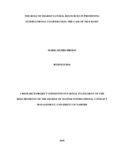| dc.description.abstract | This study sought to evaluate and determine whether the natural resources at Nile River Basin can be a source of cooperation and debunk the common myth that it is and can only be a cause of conflict. Specifically, there were three objectives sought which were to examine the discourses on shared resources as sources of conflict and cooperation, to interrogate the existing and potential conflict over the Nile River Basin resources and to examine the prospects, opportunities for Nile Resources as a source of international cooperation. The Study used the theory of Liberalism by asserting that democratic states are highly unlikely to go to war with each other, often leading to a higher capacity for co- operation with each other. To achieve these objectives, the study employed a descriptive research design and used questionnaires as the main data collection tool.
Results pointed out that poor distribution of Basin resources resulting to poverty, rapid urbanization which increases the use of Basin resources, season with low rainfall that pile pressure on the Basin resources resource as well as modernization and industrialization which leads to increased need for Basin resources are what bring about conflict or cooperation. Additionally, it was revealed that disputes concerning environmental and resource issues, dams, reservoirs, and other large-scale projects coupled with economic and social instability are other contributors to conflict in the regions with natural resources around the world. An interrogation into the existing and potential conflict over the Nile River Basin resource revealed that conflict is mainly caused by poverty, destruction of the health-supporting infrastructure of society, diversion of human and financial resources as well as forced migration. Finally, the prospects and opportunities that can lead to international prosperity were found to include proactive cooperation among countries or groups within countries is a prospect and opportunity that can be used as a source of international cooperation. Furthermore, promoting nonviolent approaches to resolving conflicts over basin resources should be encouraged.
Based on the conclusion, the study recommended building programs of institutional capacity building, developing treaties that have appropriate criteria for allocation and acknowledging the benefits of cooperative natural resource management. | en_US |



